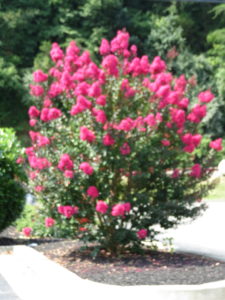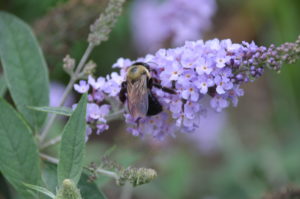 Dieback shrubs are a group of hardy landscape shrubs that emerge and grow vigorously from mid-spring through early summer. They bloom reliably from late summer into early fall. Plants are near the edge of their hardiness range, and often die back to the ground in the winter. They act more like herbaceous perennials. The above-ground shoots are not dependably winter hardy.
Dieback shrubs are a group of hardy landscape shrubs that emerge and grow vigorously from mid-spring through early summer. They bloom reliably from late summer into early fall. Plants are near the edge of their hardiness range, and often die back to the ground in the winter. They act more like herbaceous perennials. The above-ground shoots are not dependably winter hardy.
Stated another way, a dieback shrub is a woody deciduous species that grows one full plant zone lower (colder) as a perennial. A zone 7 hardy woody shrub performs more like a herbaceous perennial in zone 6. It dies back to the ground in winter and re-grows and blooms the following year. Prune the shrub back in early spring before the bud break. Their colorful flowers attract bees, butterflies, and other pollinators, and are mostly deer resistant.
Four Reliable Dieback Shrubs:
- Butterfly bush (Buddleia x davidii) is cold hardy to zone 5 which makes it suitable for most gardeners in the United States. These shrubs generally grow 2-3 feet tall, usually as wide and tall. They’re tough plants that can tolerate lean and alkaline soils. Plants perform at their best in average well-drained soil with a pH range of 5.5 to 8.5.
- Bluebeard shrub (Caryopteris spp.), also called blue mist or blue spirea, produces gray-green foliage and bright blue flowers in early summer through fall (USDA hardiness zones 5-9). Leading varieties include Petit Bleu® (rich blue blooms), ‘Worcester Gold’, and ‘Longwood Blue’.
- Chaste tree (Vitex agnus-castus) include short growing varieties like Blue Puffball™ (3-4 feet tall and wide in zones 6-9) and Blue Diddley® (3-6 feet tall in zones 5-9).
- Crape myrtle thrives in the southeast U.S. (zones 6-10), but are at risk in colder northern areas. Grow them as perennials in full sun and average well-drained soils. Select the hardiest forms from the U.S. National Arboretum. I recommend these 4 varieties such as ‘Natchez’, ‘Muskogee’, ‘Acoma’, and ‘Osage’ to try in zones 5b -6a as herbaceous perennials.


 Posted in
Posted in 
